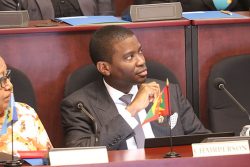Haitian President Rene Preval recently gave the IDB a mandate to work with the country’s education ministry and National Education Commission to reform its education system.
According to a press release from the Inter-American Development Bank (IDB) the five-year plan would require about US$2 billion in funding from foreign donors and will be aimed at expanding tuition-free education services in Haiti.
Currently nearly 90% of Haitian schools are private and even before the devastating earthquake of January 12 which destroyed or damaged more than 4000 schools, about half of the children of primary education age were not enrolled in school.
In a press briefing hosted on the grounds of the National Palace, Preval noted that he has limited time before his terms ends in February 2011, so he urged donors to press ahead with key initiatives that will have to be carried on by future presidents. “Let’s use these eight months to engage in projects that must continue after this period,” Preval said, urging that the steps be taken to quickly prepare the plan “so it can get moving, let’s sign as many roads projects as possible, as many electricity projects as possible. We have eight months to do all of this together.”
IDB President Luis Alberto Moreno said the Bank could provide US$250 million in grants over five years for the education reform plan which it would seek to leverage with donations from foreign universities, corporations, foundations and individuals interested in supporting Haitian educational institutions. He also said he would call on other donors such as the World Bank, to support the new plan.
“…We were given, as part of a recent capital increase, the possibility of giving Haiti US$200 million a year in grants for the next 11 years,” Moreno said, mentioning roads, water, energy, agriculture and private sector investments as other sectors in which the IDB expects to be active in the coming years. The IDB President also said the education reform plan is likely to be one of the first to be presented for additional funding to the Haitian Interim Reconstruction Commission and the Multi-Donor Trust Fund. These agencies were established after the March 31 United Nations conference where international donors pledged to provide Haiti with nearly US$10 billion to recover from the earthquake.
Along with financial support from the IDB and other donors, the Haitian government will also receive technical assistance from leading experts in education reform. One key advisor will be Paul Vallas who led the transformation of the New Orleans public schools system after Hurricane Katrina. Under the proposed reform, most Haitian schools would become publicly funded but privately run institutions, foregoing tuition charges. A central fund would be established for government to pay salaries of all teachers and school administrators participating in the new system.
According to the release, in order to participate in the reformed system, schools would have to undergo a certification process to verify the number of children served and staff hired. “As incentives to take part in the plan, schools would receive financial support to upgrade their facilities as well as text books and education materials,” the IDB said.





